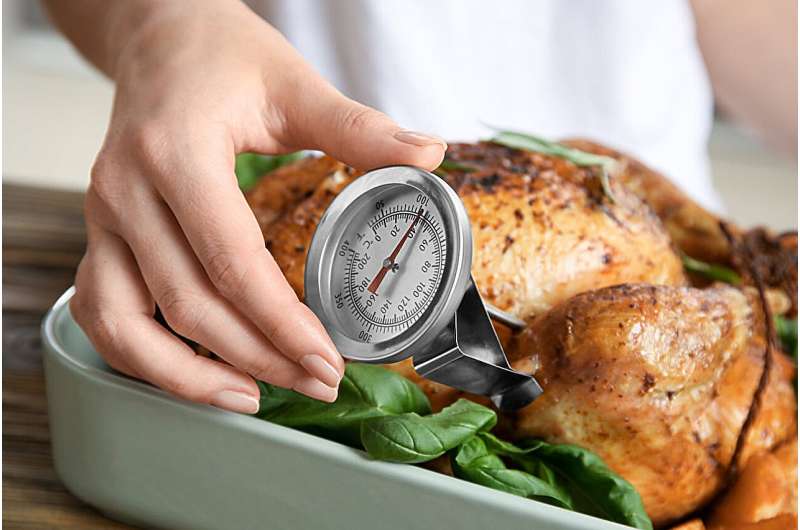This article has been reviewed according to Science X's editorial process and policies. Editors have highlighted the following attributes while ensuring the content's credibility:
fact-checked
reputable news agency
proofread
Worried about bird flu or salmonella? Your cooking thermometer could be life saver

Folks worried about bird flu, salmonella and other foodborne illnesses have a simple solution at hand—simply use a cooking thermometer to make sure food is well-cooked.
But only about one in four Americans (27%) use one either "often" or "all the time" to check whether meat, poultry or fish has reached a temperature that makes it safe to eat, a new health survey has found.
Slightly more U.S. adults (29%) said they "never" use a thermometer while cooking, results show. About 20% said they do so "rarely" and another 20% "sometimes."
"Using a food thermometer to determine that meat, poultry, fish, and eggs have been cooked to a safe internal temperature, one that kills bacteria such as E. coli and salmonella, is a way of protecting yourself from food poisoning," Kathleen Hall Jamieson, director of the Annenberg Public Policy Center of the University of Pennsylvania, said in a news release.
"Every cook should have a food thermometer within ready reach in the kitchen or near the grill," Jamieson added.
A food thermometer can make sure food is hot enough to kill bacteria and viruses, experts said.
But the survey also found that many people didn't know the temperature to which poultry and eggs should be cooked to kill off the bird flu virus and other germs.
Fewer than four in 10 respondents (38%) knew the correct temperature of 165 degrees. More than half (51%) said they weren't sure, and 4% said no temperature could kill off germs in poultry and eggs.
Few people also correctly identified 160 degrees as the proper temperature for cooking ground beef (29%), which kills E. coli bacteria, and 145 degrees for steaks and other whole cuts of beef (21%).
However, there was some encouraging news in the poll.
U.S. public health officials have warned against drinking raw or unpasteurized milk, which has been linked to bird flu outbreaks among dairy cows and other animals on dairy farms.
And it looks like most people aren't. Only 3% of U.S. adults said they'd consumed raw milk in the past 12 months, and another 4% weren't sure whether they had.
Unfortunately, people aren't aware of the link between bird flu and raw milk.
The survey found that 15% knew raw milk increases the chances of contracting bird flu, while 33% said it had no effect one way or the other and nearly half (49%) said they weren't sure.
Just over half (54%) knew raw milk is less safe to drink than pasteurized milk. About 6% said raw milk is safer, 13% said it's just as safe, and 27% said they didn't know which was safer.
In fact, unpasteurized dairy products are estimated to cause 840 times more illnesses and 45 times more hospitalizations than pasteurized products, experts said.
Between September 2023 and March 2024, 171 people were sickened and 22 hospitalized in a salmonella outbreak linked to unpasteurized milk from Raw Farm in Fresno, Calif., experts said.
As of late July, the U.S. has had 13 human cases of bird flu, with four tied to exposure to cows and nine following exposure to poultry.
The U.S. Department of Agriculture says outbreaks of bird flu have affected 168 cattle herds in 13 states, as well as more than 100 million poultry in 48 states.
The poll, conducted July 11–18, involved a representative sample of nearly 1,500 U.S. adults. It has a margin of error of plus or minus 3.6 percentage points.
More information: The U.S. Centers for Disease Control and Prevention has more about food safety.
Copyright © 2024 HealthDay. All rights reserved.




















